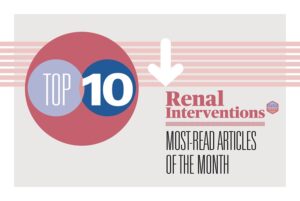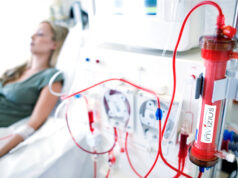 June saw a variety of stories from across the renal world, including an in-depth interview with two of the authors of the new UK Kidney Association (UKKA) vascular access guideline, as well as arteriovenous fistula (AVF) updates and industry news from Invizius and Merit Medical.
June saw a variety of stories from across the renal world, including an in-depth interview with two of the authors of the new UK Kidney Association (UKKA) vascular access guideline, as well as arteriovenous fistula (AVF) updates and industry news from Invizius and Merit Medical.
Findings from the ELUDIA study into the efficacy of ELUVIA polymer-coated low-dose paclitaxel-eluting stents for stenosis treatment have been published in the Journal of Vascular Access (JVA), with its authors describing them as “promising long-term results”.
Endovascular arteriovenous fistula (endoAVF) creation marks a “major innovation in dialysis access”. New devices, say Robert Shahverdyan (Hamburg, Germany) and Simon Hogan (London, UK) in conversation with Kate Steiner (Stevenage, UK), promise to improve outcomes and expand the population of patients that can benefit from these procedures.
The results of a new study in the Annals of Vascular Surgery suggest that patients who also have a tunnelled dialysis catheter (TDC) do not significantly benefit from receiving a brachiocephalic fistula (BCF) compared with a radiocephalic fistula (RCF).
The recent haemodialysis access guideline update from the UKKA marks a considerable shift in how the organisation recommends that clinicians approach choices in vascular access for patients. We spoke to Damien Ashby (London, UK) and Catherine Fielding (Derby, UK) on the writing process.
Andrew Frankel, consultant physician and nephrologist at Imperial College Healthcare NHS Trust (London, UK), writes to set out the process behind the new guideline from the UK Guideline Group on sodium glucose co-transporter 2 inhibitors (SGLT2i) in kidney disease treatment, presented on at UK Kidney Week (5–7 June, Newport, UK).
Invizius, a biotechnology company developing second generation therapies for a range of complement-driven autoimmune and inflammatory disorders, has announced that it has recruited its 300th patient to its ‘angry blood’ study, CompAct-HD. This, it says, is a “significant milestone” in its “novel kinetic study” to identify patients with elevated complement responses during haemodialysis, what it calls ‘angry blood’, who may have a high risk of serious cardiovascular complications, an Invizius press release notes.
Research published in Kidney International Reports has found that the ChatGPT artificial intelligence (AI) language model (OpenAI) fails to consistently provide accurate answers to clinical questions in the treatment of glomerular disease. Though it recently achieved an “impressive” score on the United States Medical Licensing Examination, it still has “a long path to go” on before it is a useful tool for nephrologists, say a team of authors led by Jing Miao (Rochester, USA).
Merit Medical Systems announced that it has completed the acquisition of a portfolio of dialysis catheter products, including the BioFlo DuraMax dialysis catheter, and the BioSentry biopsy tract sealant system.
American Society of Diagnostic and Interventional Nephrology (ASDIN) certification and accreditation chairman Daniel Patel is the medical director for interventional nephrology at the Volusia-Flagler Vascular Center, which he founded in his hometown of Daytona Beach, USA. He speaks to Renal Interventions to discuss everything interventional nephrology (IN), connecting with patients, and the unlikely similarity between snowboarding and doing procedures.
AWAK Technologies and Singapore General Hospital (SGH) have announced the launch of a pre-pivotal clinical trial with the enrolment of their first subject to study the safety and efficacy of an “improved” Automated Wearable Artificial Kidney Peritoneal Dialysis (AWAK PD) device, according to a press release.












